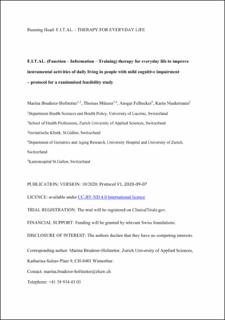Please use this identifier to cite or link to this item:
https://doi.org/10.21256/zhaw-26535| Publication type: | Working paper – expertise – study |
| Title: | F.I.T.AL. (Function – Information – Training) therapy for everyday life to improve instrumental activities of daily living in people with mild cognitive impairment : protocol for a randomised feasibility study |
| Authors: | Bruderer-Hofstetter, Marina Münzer, Thomas Felbecker, Ansgar Niedermann Schneider, Karin |
| et. al: | No |
| DOI: | 10.5281/zenodo.4107106 10.21256/zhaw-26535 |
| Extent: | 46 |
| Issue Date: | 2020 |
| Publisher / Ed. Institution: | Zenodo |
| Language: | English |
| Subjects: | Mild cognitive impairment; Multi-component intervention; Physical exercise; Cognitive training; Instrumental activities of daily living |
| Subject (DDC): | 615.82: Physical therapy 616.8: Neurology, diseases of nervous system |
| Abstract: | Background: Instrumental activities of daily living (IADL) are key to independently participate in social life for people with mild cognitive impairment (MCI). There is currently no recommended pharmacological treatment available to reduce the impact of cognitive loss on functioning in people with MCI. The primary aim of this protocol is to evaluate the feasibility and acceptability of the F.I.T.AL. individually-tailored, multi-component intervention, aimed at stabilizing or even improve IADL functioning. The secondary aim is to explore the preliminary efficacy of F.I.T.AL. Methods: A two-arm randomized feasibility trial will be conducted at two memory clinics in Switzerland. Thirty-two people with MCI, aged 60 and over, together with their caregivers, will be recruited and randomly assigned to either the multi-component intervention or to the control intervention. The multi-component intervention F.I.T.AL., developed in a multi-step approach including patient and public involvement, will be conducted for six months. The intervention includes components of cognitive training strategy, physical exercise, and information and support. The control intervention will be comprised of only the information and support portion. Primarily feasibility and acceptability outcomes will be investigated. Feasibility outcomes will include: (1) Recruitment, using the number of eligible individuals; (2) Enrollment, by calculating the proportion of eligible individuals randomised; (3) Retention, assessed by the drop-out rate; and (4) Completeness of outcome measures. Acceptability and adherence outcomes will include: (1) Attendance rates; (2) Adherence to the intervention protocol, in terms of number and duration of completed intervention sessions; and, (3) Intervention intensity. The secondary outcomes will comprise: (1) The German version of the Amsterdam IADL questionnaire; (2) Physical function (i.e. endurance, lower extremity strength, balance, mobility, gait speed, functional mobility, physical activtity); (3) Cognitive function (i.e. global cognition, memory, executive function, attention); and, (4) Perceived social support. Discussion: F.I.T.AL. was designed to target IADL functioning in people with MCI, using a multi-step and multi-professional approach that includes patient and public involvement. It is anticipated that F.I.T.AL. will be feasible, acceptable and also have the potential to stabilize or even improve IADL performance. |
| URI: | https://digitalcollection.zhaw.ch/handle/11475/26535 |
| License (according to publishing contract): | CC BY-ND 4.0: Attribution - NoDerivatives 4.0 International |
| Departement: | School of Health Sciences |
| Organisational Unit: | Institute of Physiotherapy (IPT) |
| Appears in collections: | Publikationen Gesundheit |
Files in This Item:
| File | Description | Size | Format | |
|---|---|---|---|---|
| 2021_Bruderer-etal_F-I-T-AL-therapy-everyday-life-improve-IADL-people-MCI_study-protocol.pdf | 2.76 MB | Adobe PDF |  View/Open |
Show full item record
Bruderer-Hofstetter, M., Münzer, T., Felbecker, A., & Niedermann Schneider, K. (2020). F.I.T.AL. (Function – Information – Training) therapy for everyday life to improve instrumental activities of daily living in people with mild cognitive impairment : protocol for a randomised feasibility study. Zenodo. https://doi.org/10.5281/zenodo.4107106
Bruderer-Hofstetter, M. et al. (2020) F.I.T.AL. (Function – Information – Training) therapy for everyday life to improve instrumental activities of daily living in people with mild cognitive impairment : protocol for a randomised feasibility study. Zenodo. Available at: https://doi.org/10.5281/zenodo.4107106.
M. Bruderer-Hofstetter, T. Münzer, A. Felbecker, and K. Niedermann Schneider, “F.I.T.AL. (Function – Information – Training) therapy for everyday life to improve instrumental activities of daily living in people with mild cognitive impairment : protocol for a randomised feasibility study,” Zenodo, 2020. doi: 10.5281/zenodo.4107106.
BRUDERER-HOFSTETTER, Marina, Thomas MÜNZER, Ansgar FELBECKER und Karin NIEDERMANN SCHNEIDER, 2020. F.I.T.AL. (Function – Information – Training) therapy for everyday life to improve instrumental activities of daily living in people with mild cognitive impairment : protocol for a randomised feasibility study. Zenodo
Bruderer-Hofstetter, Marina, Thomas Münzer, Ansgar Felbecker, and Karin Niedermann Schneider. 2020. “F.I.T.AL. (Function – Information – Training) Therapy for Everyday Life to Improve Instrumental Activities of Daily Living in People with Mild Cognitive Impairment : Protocol for a Randomised Feasibility Study.” Zenodo. https://doi.org/10.5281/zenodo.4107106.
Bruderer-Hofstetter, Marina, et al. F.I.T.AL. (Function – Information – Training) Therapy for Everyday Life to Improve Instrumental Activities of Daily Living in People with Mild Cognitive Impairment : Protocol for a Randomised Feasibility Study. Zenodo, 2020, https://doi.org/10.5281/zenodo.4107106.
Items in DSpace are protected by copyright, with all rights reserved, unless otherwise indicated.